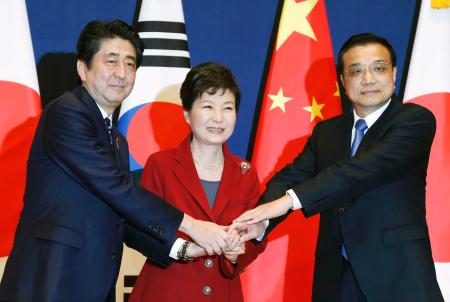ID :
385885
Mon, 11/02/2015 - 05:06
Auther :
Shortlink :
https://oananews.org//node/385885
The shortlink copeid
Japan, China to resume long-stalled ministerial talks next year

SEOUL, Nov. 1 Kyodo - Japanese Prime Minister Shinzo Abe and Chinese Premier Li Keqiang agreed on Sunday, in their first one-on-one talks, that the two countries will resume high-level economic dialogue at an early date in 2016, following a six-year hiatus.
The dialogue, which also addresses political issues, will be co-hosted by the Japanese foreign minister and a Chinese vice premier and will involve numerous ministers from the two countries. It has been on hold since August 2010.
Abe and Li also agreed to resume reciprocal visits by the two countries' foreign ministers, Japan's Deputy Chief Cabinet Secretary Koichi Hagiuda told reporters.
Abe said he has "unwavering faith" in the principle of building strategic relations of mutual benefit with China, amid a gradual-but-sure improvement in diplomatic relations between Tokyo and Beijing.
However, Li said that for the better future of the two Asian powers they should properly handle sensitive historical issues.
The meeting in Seoul took place after the two premiers and South Korean President Park Geun Hye attended a trilateral summit, during which the three major Asian economies, for the first time in more than three years, expressed together their resolve to strengthen cooperation. Despite lingering tensions over territorial and historical issues, senior officials from Japan and China are more in touch with each other and exchanges in nonpolitical areas have picked up since Abe met Chinese President Xi Jinping twice since last November.
Earlier in the day, Japanese Foreign Minister Fumio Kishida separately agreed with his Chinese counterpart Wang Yi that the two countries should strengthen their rapprochement efforts.
The annual three-way summit had been suspended since May 2012. The hiatus was mainly because of Japan's soured relations with its two neighboring countries over territorial disputes and what they see as Tokyo's failure to properly atone for the suffering it caused before and during World War II.
Much of Abe's discussions with Li focused on ways to give added impetus to the ongoing thaw in relations between Tokyo and Beijing, according to Japanese officials.
Among other issues, however, Abe touched on China's unilateral gas field development near the median line between its shoreline and that of Japan in the East China Sea, the officials said.
In July, Japan unveiled a map and aerial photographs of 12 offshore structures as evidence of the Chinese action and criticized the country for carrying out the work counter to the spirit of a 2008 accord between the two nations on joint gas development in the area.
Abe and Li agreed that the two countries will aim for the early resumption of long-stalled negotiations on a joint gas development project in the sea, according to Hagiuda.
The two leaders also agreed to speed up the process of setting up a maritime communication mechanism as part of efforts to avert accidental clashes in the East China Sea, he said.
Abe was expected to express concerns over China's rapid island-building activities in the disputed South China Sea.
Japanese government officials said late last month that Abe would tell Li the activities are "unilateral attempts to change the status quo," and would urge China to respect freedom of navigation and international rules.
But Hagiuda and other senior Japanese officials refused to confirm whether the leaders discussed the South China Sea and other delicate issues, citing a promise that they made with the Chinese side at the meeting, which lasted nearly one hour.
==Kyodo





